Friday Feb 27, 2026
Friday Feb 27, 2026
Friday, 13 October 2023 00:04 - - {{hitsCtrl.values.hits}}
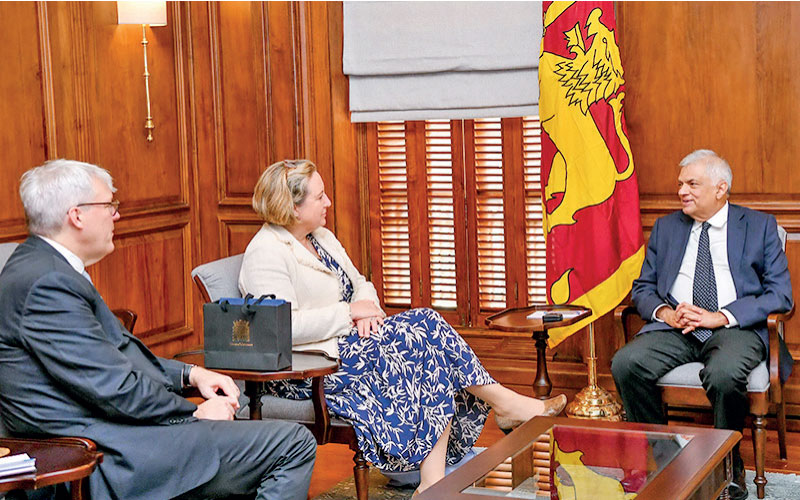
UK Foreign, Commonwealth and Development Minister for the Indo-Pacific, Anne-Marie Trevelyan and High Commissioner Patrick meet President Wickremesinghe
UK Foreign, Commonwealth and Development Minister for the Indo-Pacific, Anne-Marie Trevelyan arrived in Sri Lanka this week for a three-day official visit. The visit to Colombo and Jaffna marks the celebration of 75 years of diplomatic relations between the UK and Sri Lanka. It is also the Minister’s first visit to Sri Lanka in her role and coincides with the 23rd meeting of the Indian Ocean Rim Association, the chairmanship of which is Sri Lanka. In this exclusive interview with the Daily FT, Trevelyan shares key insights to the strong ties between the UK and Sri Lanka; future priorities in cooperation with and support to Sri Lanka to meet the country’s challenges. Following are excerpts
|
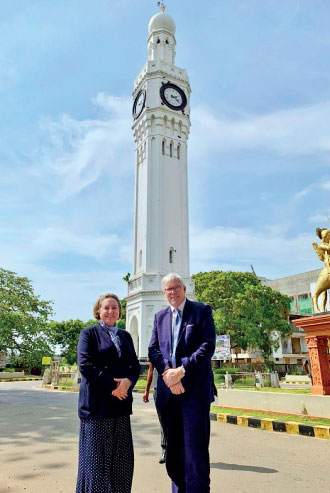 |
| Minister Trevelyan with High Commissioner Andrew Patrick in Jaffna |
Q: What do you hope your visit to Sri Lanka would achieve?
I’m excited to be here on my first visit to Sri Lanka as FCDO Minister for the Indo-Pacific, particularly as we celebrate 75 years of UK-Sri Lanka bilateral relations. Together we will discuss key regional issues, from climate change to maritime security.
While here I attended the Indian Ocean Rim Association (IORA) meeting to showcase UK commitment to the Indian Ocean region, including increasing joint work on maritime security, environmental protection and human rights. With Sri Lanka as IORA Chair, I hope that together we can make progress on identifying fresh opportunities for our shared interests, including developing our trade ties. This includes UK support towards Sri Lanka’s economic recovery to complement IMF, World Bank and Asian Development Bank support.
Q: What are the UK's priorities in cooperation with Sri Lanka?
Climate action and economic growth are key areas for our joint work, as well as working together on post-conflict reconciliation and improving human rights.
On climate action, we will boost sustainable trade between our countries, including through the UK’s new Developing Countries Trading Scheme (DCTS), which gives developing countries access to the UK’s simpler and more generous preferential trading scheme by cutting tariffs, removing conditions and simplifying trading rules.
Through growing our shared commitments in these areas, the UK is increasing its long-term commitment to the Indo-Pacific, deepening our partnerships with Sri Lanka and other key players through regional forums such as IORA.
Q: What support can the UK provide to Sri Lanka to help ensure lasting peace?
We want to support Sri Lanka to be a thriving economy, where issues from the past are addressed and human rights are better protected.
Last year the UK provided £3m in humanitarian support through UN and Red Cross partners, reaching around 70,000 of those worst affected by the economic crisis. We will continue to help address legacies of conflict, promote human rights and build cohesion across communities, including through our £11m Conflict, Stability and Security Fund (CSSF) program 2022-2025.
Building lasting and inclusive peace is key to a stable Sri Lanka, and it will attract foreign investment and help Sri Lanka achieve its economic potential.
Q: How can the UK and Sri Lanka work together on environmental protection?
The UK remains committed to delivering on the $100bn Climate Finance goal this year to support countries most vulnerable to climate shocks, including Sri Lanka. During my visit this week, I had the opportunity to discuss the progress to avert, minimise, and address the impacts of climate change. Supporting Sri Lanka’s climate work, we have several programs from COP26 Glasgow Pact and The Commonwealth Blue Charter, to the Blue Planet Fund.
At the G20, the Prime Minister announced that the UK will provide $2bn (£1.62bn) to the second replenishment of the Green Climate Fund (GCF), covering 2024-27. This is the biggest single funding commitment the UK has made to help the world tackle climate change by supporting countries to reduce global emissions and help communities adapt.
I am encouraged to see the Sri Lankan Government’s prioritisation of green growth, including plans to achieve net zero by 2050 and 70% renewable energy in electricity generation by 2030, their National Determined Contribution (NDC) and 2022 Climate Prosperity Plan.
Q: You attended the Indian Ocean Rim Association (IORA) meeting during your visit. What was agreed, and how will the UK work with Sri Lanka on this agenda?
We announced our intention to develop a package of activities to ensure that we meet our mutual climate and maritime security goals, and strengthen our partnership with IORA members. This includes growing joint maritime capabilities, developing a joint concept with India for a new regional security centre, and looking at the management of fish stocks and of piracy in the Indian Ocean. I look forward to working with Sri Lanka to develop these further during their IORA chairmanship.
Q: What are the trade and investment opportunities available, and in what manner would UK support?
The UK supports a long-term trading relationship with Sri Lanka based on free and fair trade. As Sri Lanka’s 2nd largest export destination, the UK remains one of the world's most open and connected financial centres with banks such as, HSBC and Standard Chartered operating in Sri Lanka for decades. We are keen to continue exploring opportunities for UK financial and professional service providers in the market.
Earlier this year, the UK implemented one of the most generous preferential trading schemes in the world. Sri Lanka is one of 65 countries benefiting from the UK’s DCTS that provides tariff reductions and simpler terms of trade. Sri Lanka can now trade with the UK tariff-free on 92% of goods, leading to increased competitiveness of Sri Lankan products on the UK market.
Q: What educational opportunities are available for Sri Lankan students?
Sitting at the top of the world rankings, UK universities have a reputation for developing the skills that global employers are looking for. With the option of a two-year post-study work visa for international students, Sri Lankan graduates in the UK can get a head-start on their career as soon as they have completed their studies. Several UK universities also partner with Sri Lankan institutions to help Sri Lankans get a top education here in Sri Lanka without the expense of travelling to the UK.
Through Chevening scholarships, Sri Lankan students have the opportunity to apply for a fully funded one-year Master’s degree at a leading UK University. Chevening is the UK Government’s international scholarships and fellowships program offering individuals from all backgrounds the potential to gain a UK educational qualification, and create positive change in their home country.
With over 80 years of expertise in delivering English language education, the British Council also offers a range of English courses for children, adults and teachers. They have libraries in Colombo, Kandy and Jaffna.
Q: What is special about UK and Sri Lanka relationship?
The UK and Sri Lanka share many strong people-to-people ties and common interests, which make us natural partners through the Commonwealth, but I would highlight education, trade and security, a shared love for cricket, and of course, tea.
This year marks 75 years of diplomatic ties between the UK and Sri Lanka. As part of the celebrations, the British High Commission is running a campaign, ’75 Stories,’ featuring Sri Lankans who have made significant contributions in the UK and UK nationals who have made similar contributions in Sri Lanka.
We are proud of our people-to-people links, and of the hundreds of thousands of people of Sri Lankan origin living in the UK who help to make our country as successful as it is today.
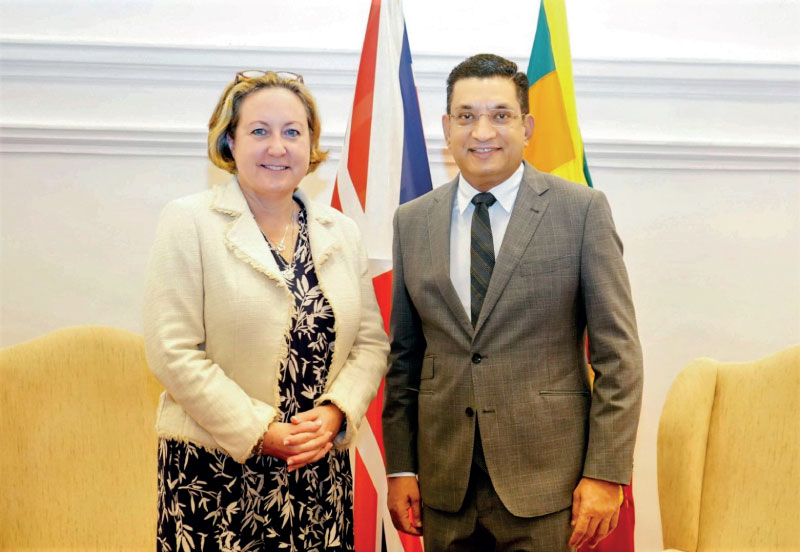
Minister Trevelyan and Foreign Minister Ali Sabry
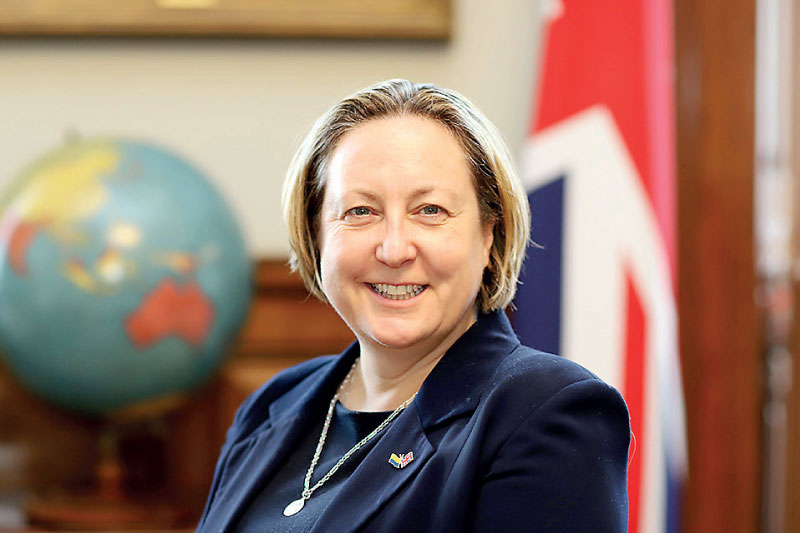
Minister Anne-Marie Trevelyan
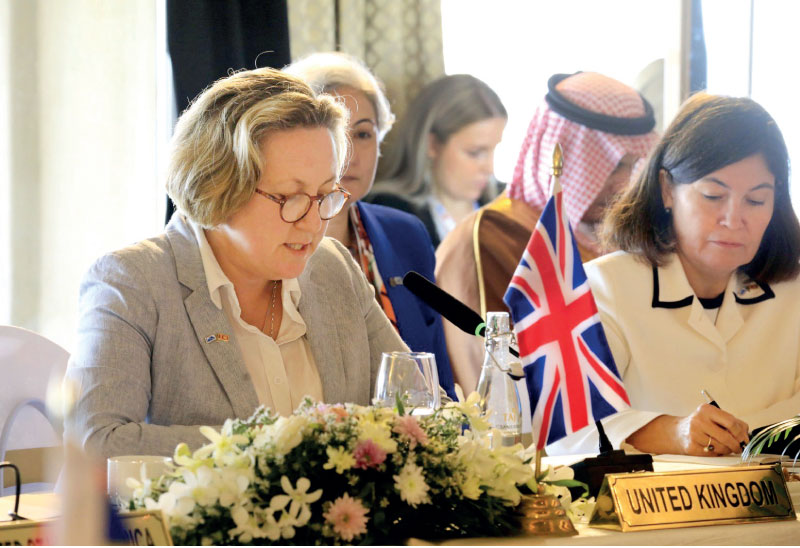
Minister Trevelyan at IORA
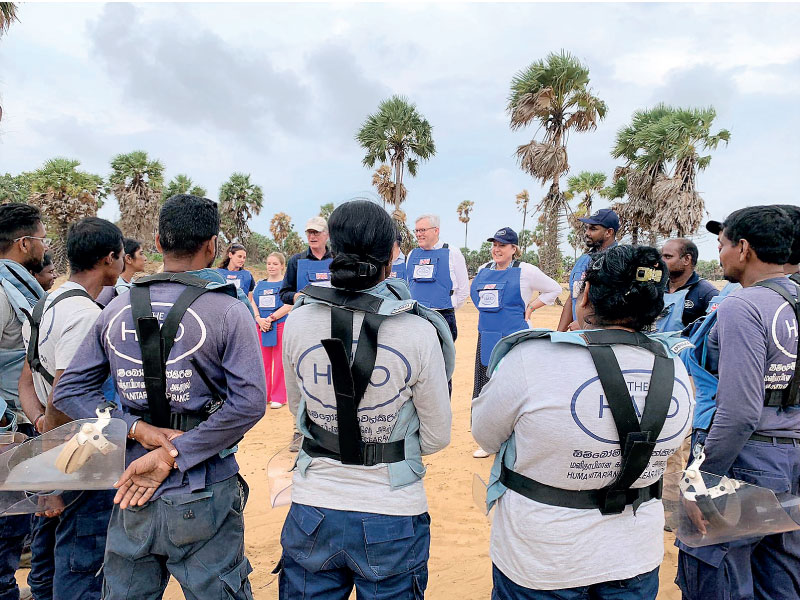
Demining program through UK’s Conflict, Security and Stability Fund

Demining program through UK’s Conflict, Security and Stability Fund